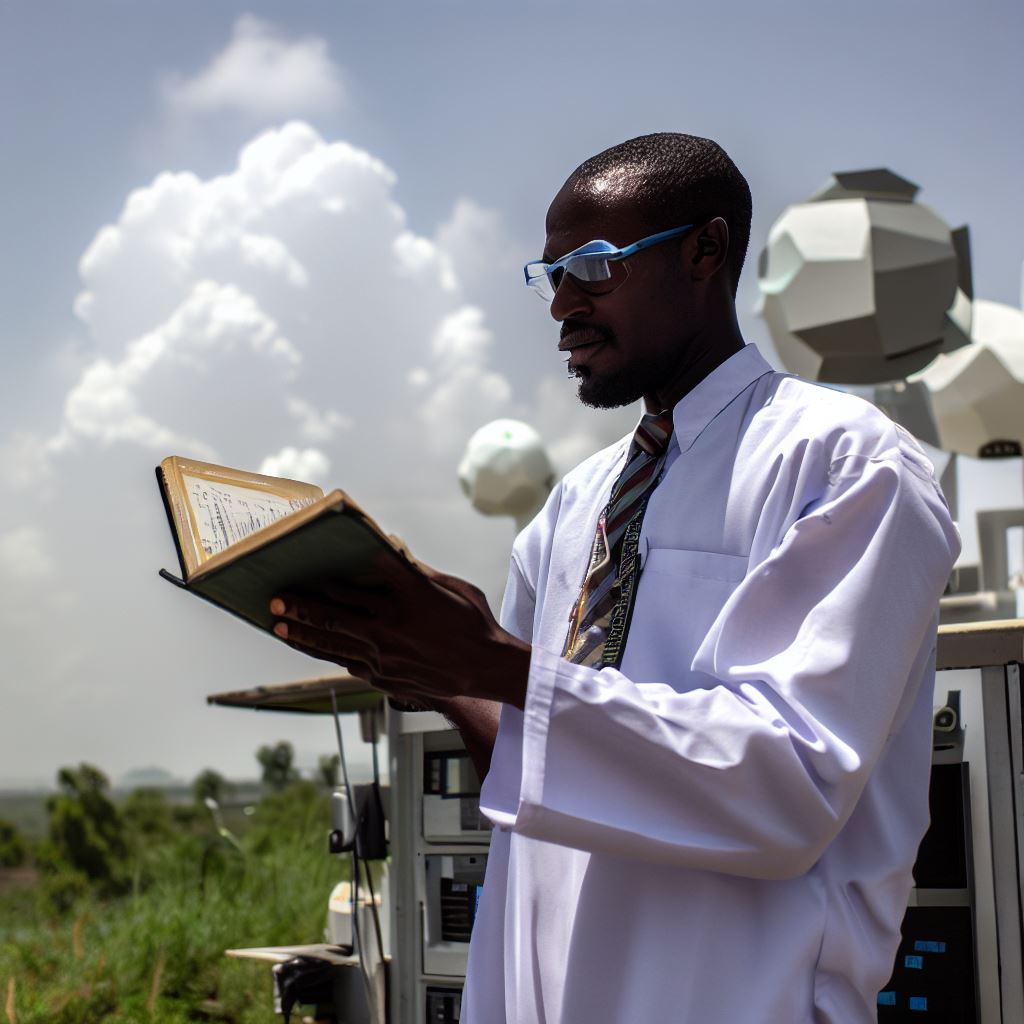Introduction
Weather forecasting is the science of predicting the state of the atmosphere at a specific time and location.
It involves analyzing various meteorological data and using mathematical models to estimate future weather conditions.
In Nigeria, weather forecasting plays a vital role in several sectors.
One of the key importance of weather forecasting in Nigeria is its ability to enhance planning.
Knowing the weather conditions beforehand helps individuals, businesses, and government agencies make informed decisions.
For instance, farmers can determine the most suitable time to plant crops based on the projected rainfall patterns.
Construction companies can plan their activities in alignment with expected weather conditions, reducing project delays and increasing efficiency.
Additionally, weather forecasting plays a crucial role in disaster management. Nigeria is prone to natural disasters such as floods, storms, and droughts.
Accurate weather predictions enable early warning systems to be put in place, giving communities time to evacuate and take necessary precautions.
This can save lives and minimize the impact of natural disasters.
Weather forecasting also supports the aviation and transportation sectors in Nigeria.
Pilots rely on accurate weather forecasts to plan flight routes and avoid hazardous weather conditions.
Similarly, road transport and maritime industries consider weather predictions to ensure the safety of their operations.
In fact, weather forecasting is of utmost importance in Nigeria. It aids in planning, disaster management, agriculture, and various other sectors.
By understanding future weather conditions, individuals and organizations can make better-informed decisions and adapt appropriately.
Therefore, the advancement of weather forecasting techniques and technologies is essential for the development and progress of the country.
Historical background of weather forecasting in Nigeria
Early methods and techniques used
- Indigenous communities used traditional methods like observing animal behavior and celestial patterns.
- These methods were based on experience and passed down through generations.
- Indigenous weather forecasters relied heavily on folk wisdom and natural signs.
- Techniques included studying the movement of birds, the behavior of insects, and the color of the sky.
- Communities also used local proverbs and sayings to predict weather conditions.
Introduction of modern weather forecasting techniques
- In the 19th century, European countries introduced modern weather forecasting techniques to Nigeria.
- The arrival of British colonizers brought scientific methods to predict weather conditions.
- Meteorological instruments such as barometers, thermometers, and anemometers were introduced.
- Weather stations were established across Nigeria to collect data and make more accurate predictions.
- The introduction of telegraphy facilitated the transmission of weather data across different regions in the country.
Development of the Nigerian Meteorological Agency (NiMet)
- The Nigerian Meteorological Service was established in 1952 under the colonial administration.
- It was later transformed into the Nigerian Meteorological Agency (NiMet) in 2003.
- NiMet is responsible for weather forecasting, climate monitoring, and aviation meteorology in Nigeria.
- The agency operates weather stations, radar systems, and weather forecasting models.
- NiMet collaborates with international meteorological organizations to enhance weather forecast accuracy.
Overall, weather forecasting in Nigeria has evolved from traditional methods to modern scientific techniques.
Indigenous communities relied on observation-based methods, while the British colonization introduced advanced instruments and forecasting methods.
The establishment of the Nigerian Meteorological Agency (NiMet) further enhanced the accuracy and reliability of weather forecasts in the country.
NiMet continues to play a crucial role in providing weather information for various sectors, including agriculture, aviation, and disaster management.
Read: Atmospheric Research Centers in Nigeria: A Tour
Fundamentals of weather forecasting
Weather forecasting in Nigeria relies on a solid foundation of fundamental techniques.
These techniques involve the collection, analysis, and interpretation of meteorological data to accurately predict and forecast weather conditions.
Collection of meteorological data
Weather stations and instruments used
In Nigeria, a network of weather stations equipped with various instruments is set up to gather data.
These instruments include thermometers, barometers, anemometers, and rain gauges. They measure temperature, pressure, wind speed, and precipitation.
Satellite and radar technologies
Sophisticated satellite and radar technologies are employed to provide additional data on a larger scale.
Satellites capture images of cloud formations, atmospheric moisture, and temperature profiles. Radars detect precipitation and analyze cloud characteristics.
Data analysis and interpretation
Meteorological models
Meteorological models utilize complex mathematical equations that simulate the behavior of the Earth’s atmosphere.
These models process the collected data and generate forecasts based on atmospheric conditions and previous patterns.
Computer simulations and algorithms
Computer simulations are created by inputting meteorological data into powerful computer systems.
Algorithms analyze the data to identify patterns, relationships, and trends, enabling meteorologists to make accurate predictions.
Prediction and forecasting methods.
Numerical weather prediction
Numerical weather prediction involves using mathematical models to calculate future weather conditions.
Based on initial conditions, such as temperature, pressure, and humidity, models project how these factors will evolve over time, allowing for the prediction of weather patterns.
Ensemble forecasting
Ensemble forecasting employs multiple meteorological models and simulations to create a range of possible weather scenarios.
This approach considers the inherent uncertainties in atmospheric conditions, providing a more comprehensive understanding of potential weather outcomes.
Climatology and statistical forecasting
- Climatology and statistical forecasting involve analyzing historical weather data to identify recurring patterns and trends.
- By examining long-term climate records, meteorologists can make predictions based on statistical probabilities, taking into account seasonal variations.
In short, weather forecasting in Nigeria relies on the collection of meteorological data through weather stations, instruments, satellites, and radars.
This data is analyzed using meteorological models, computer simulations, and algorithms.
Numerical, ensemble and statistical methods ensure precise weather predictions.
These fundamental techniques ensure that Nigerians receive reliable and timely weather information, aiding in disaster preparedness, agriculture, and everyday planning.
Read: Climate Research in Nigeria: Atmospheric Scientists

Challenges of Weather Forecasting in Nigeria
Limited weather stations and data gaps
The lack of a comprehensive network of weather stations in Nigeria poses a significant challenge to accurate weather forecasting.
This limited coverage of weather stations results in data gaps, making it difficult to obtain a complete and detailed picture of the weather conditions across the country.
Without a sufficient number of weather stations, meteorologists struggle to gather the necessary data to generate accurate forecasts.
Inadequate infrastructure and technology
Inadequate infrastructure and outdated technology further compound the challenges faced in weather forecasting in Nigeria.
The lack of modern equipment and technology hampers the ability to gather precise data and analyze it effectively.
Outdated systems also limit the capacity to process and disseminate weather information in a timely manner.
These infrastructure and technological limitations hinder the accuracy and reliability of weather forecasts.
Complex weather patterns and topography
Nigeria’s diverse topography and complex weather patterns pose significant challenges to weather forecasting efforts.
The country experiences a range of climates, from the arid north to the temperate south, leading to variations in weather patterns.
The presence of mountains, plateaus, and coastal areas further complicates the prediction of weather phenomena.
Meteorologists must grapple with the intricacies of these complex systems, making accurate forecasts more challenging.
Funding and resource constraints
The limited funding allocated to weather forecasting initiatives in Nigeria restricts the availability of essential resources.
Lack of adequate investment in weather prediction technologies, research, and training affects the accuracy of forecasts.
The scarcity of resources hampers the ability to expand the weather station network, upgrade equipment, and employ skilled personnel.
Insufficient funding and resource constraints create obstacles to improving weather forecasting capabilities.
Public awareness and communication issues
- Effective communication of weather forecasts and raising public awareness about their significance is a persistent challenge in Nigeria.
- Many Nigerians lack access to timely and accurate weather information, limiting their preparedness for extreme weather events.
- Language diversity, low literacy, and communication reach limit weather forecast dissemination.
- Improving public awareness and developing efficient communication strategies are crucial for enhancing the effectiveness of weather forecasting efforts.
In summary, weather forecasting in Nigeria grapples with challenges like limited stations, data gaps, tech gaps, complex weather, funding, and awareness.
Addressing these challenges is crucial for improving the accuracy and effectiveness of weather forecasts to support decision-making, disaster preparedness, and public safety.
Read: Atmospheric Science Jobs in Nigeria: A Guide
Role of the Nigerian Meteorological Agency (NiMet)
In this section, we will discuss the role of the Nigerian Meteorological Agency (NiMet) in weather forecasting in Nigeria.
Responsibilities and Functions of NiMet
- NiMet is responsible for the provision of weather forecasts, warnings, and advisories to the Nigerian public.
- They provide specialized meteorological services to sectors such as aviation, agriculture, maritime, and tourism.
- NiMet conducts research and development activities to improve meteorological services in the country.
- They monitor and analyze weather data to provide accurate and timely information for decision-making.
- NiMet maintains a network of weather stations across Nigeria for data collection and analysis.
Collaboration with International Meteorological Organizations
- NiMet collaborates with international meteorological organizations to enhance weather forecasting capabilities.
- They are an active member of the World Meteorological Organization (WMO) and participate in global meteorological initiatives.
- NiMet exchanges weather data and information with other national meteorological agencies for improved predictions.
- Through collaboration, NiMet gains access to advanced forecasting models and technologies.
- These partnerships also allow for the exchange of expertise and training opportunities for NiMet staff.
Efforts to Improve Weather Forecasting in Nigeria
- NiMet continuously upgrades its forecasting infrastructure to enhance accuracy and reliability.
- They invest in modern meteorological equipment, including weather radars, satellites, and computer models.
- NiMet collaborates with universities and research institutions to develop localized forecasting models.
- They conduct regular capacity-building programs for meteorologists to enhance their skills and knowledge.
- NiMet is involved in public awareness campaigns to educate the Nigerian public about weather forecasting.
- They work with media outlets to disseminate weather information and ensure its wide reach.
- NiMet is actively involved in climate change studies to better understand its impact on weather patterns in Nigeria.
In essence, the Nigerian Meteorological Agency (NiMet) plays a crucial role in weather forecasting in Nigeria.
NiMet provides accurate, timely weather forecasts, warnings, and meteorological services for the Nigerian public.
The agency collaborates with global meteorological organizations for knowledge exchange, advanced technology access, and expertise development.
NiMet strives for better forecasting via infrastructure, equipment upgrades, research, capacity-building, awareness, and climate change studies.
Through these initiatives, NiMet aims to enhance the accuracy, reliability, and overall effectiveness of weather forecasting in Nigeria.
Benefits of Accurate Weather Forecasting in Nigeria
Accurate weather forecasting in Nigeria offers numerous benefits across different sectors and aspects of society.
Analyzing and predicting weather patterns precisely aids economic planning, disaster readiness, and public safety, enhancing well-being.
Economic implications
Agriculture and food security
Accurate weather forecasting plays a vital role in the agriculture sector, which is a significant contributor to Nigeria’s economy.
Farmers heavily rely on weather information to plan their activities, such as planting, irrigation, and harvesting.
Timely and accurate forecasts enable farmers to optimize their agricultural practices, reducing losses and maximizing yields.
This, in turn, ensures food security by enhancing crop production.
Aviation and transportation
Accurate weather forecasts are essential for the aviation and transportation industries. Weather conditions greatly impact flight operations, air traffic control, and navigation.
With precise forecasts, airlines can better plan their schedules, optimize fuel consumption, and minimize the disruption caused by adverse weather conditions.
Similarly, accurate forecasts allow transportation companies to plan routes, schedules, and logistics efficiently, reducing delays and improving overall operational efficiency.
Energy and power generation
Weather patterns significantly influence energy and power generation in Nigeria.
Accurate forecasts help energy companies plan and manage their generation resources effectively.
By analyzing weather data, power generation can be optimized, reducing costs and ensuring a stable energy supply.
Additionally, accurate forecasts enable better planning for renewable energy sources such as solar and wind, enhancing the efficiency and reliability of these energy systems.
Disaster preparedness and management
Early warning systems
Accurate weather forecasts enable the implementation of early warning systems to mitigate the impact of natural disasters like floods, droughts, and storms.
Timely dissemination of forecast information helps authorities and communities prepare and take necessary precautions in advance.
This allows for prompt evacuation, activation of emergency response teams, and relocation of valuable assets, minimizing potential damages and saving lives.
Mitigation of climate-related risks
Climate change poses significant risks in Nigeria, including increased frequency and intensity of extreme weather events.
Accurate weather forecasting assists in identifying and understanding these climate-related risks, such as heatwaves, heavy rainfall, and cyclones.
Forecasts enable mitigation plans, like bolstering infrastructure, flood control, and disaster response, through detailed information provision.
Public safety and well-being
- Accurate weather forecasts have a direct impact on public safety and well-being.
- By providing timely and reliable information, forecasts enable individuals to make informed decisions related to their safety during extreme weather events.
- Citizens can prepare by staying indoors during heatwaves, securing properties for storms, and arranging alternate transport in heavy rainfall.
- Accurate forecasts help reduce risks and protect the well-being of individuals, communities, and infrastructure.
Most importantly, accurate weather forecasting in Nigeria brings numerous benefits across various sectors.
It aids economic planning, food security, aviation, transportation efficiency, energy generation, and disaster preparedness and management.
Accurate forecasts enhance public safety, enabling informed decisions during extreme weather events, and promoting well-being.
Technological advancements and improved forecasting models help Nigeria prepare for weather-related challenges and reap these benefits.
Publish Your Professional Profile, Business or Brand
Showcase your expertise, gain trust, and boost visibility instantly on Professions.ng.
Publish NowRead: Meet Nigeria’s Top Atmospheric Scientists: A Review
Future prospects and advancements in weather forecasting technology
Adoption of advanced weather prediction models
- Improved accuracy in weather forecasts.
- Integration of global weather data for more precise predictions.
- Utilization of sophisticated mathematical algorithms to analyze complex weather patterns.
- Enhanced understanding of atmospheric conditions leading to better forecasting capabilities.
Integration of artificial intelligence and machine learning
- Development of AI systems to process vast amounts of meteorological data.
- Machine learning algorithms help to identify patterns and make accurate predictions.
- Real-time monitoring and analysis of weather conditions for immediate updates.
- AI-powered forecasting models provide tailored predictions for localized areas.
Enhanced data collection and processing techniques
- Deployment of advanced weather monitoring instruments and satellites.
- Improved data transmission and communication infrastructure.
- Integration of weather sensors into everyday devices for comprehensive data collection.
- High-resolution satellite imagery for precise tracking of weather systems.
Conclusion
Weather forecasting in Nigeria plays a vital role in various aspects of the country’s development and societal well-being.
To ensure the effectiveness and accuracy of weather forecasts, improved funding and support for weather forecasting initiatives are crucial.
Investment in weather forecasting can enhance disaster readiness, boost agriculture, and elevate public safety standards.
The synergy between meteorological agencies and international organizations strengthens forecasting capabilities.
As technology evolves, ongoing training and technology updates are imperative for meteorological professionals.
In closing, accurate weather forecasts are an asset to Nigeria’s progress. Adequate support, funding, and collaboration are key.




